Overview
Are you grinding teeth in your sleep?
Teeth grinding is clinically referred by dentist as bruxism. Patients are frequently unaware of this habit because they are grinding teeth in sleep.This condition is usually referred to by dentist as sleep bruxism. Sleep bruxism is a medical and dental problem as it affects both the teeth and the structures of the face and neck. Most people will not realize that they have this habit until obvious signs and symptoms occur.
Symptoms of Teeth Grinding
- Wearing away of teeth. Teeth appears to be shorter or flatter. Wear faucets are usually seen on the teeth.
- Clicking sound heard on opening and closing the jaw. Abnormal teeth grinding habits causes Temporomandibular Joint Disorders due to stress and abnormal positioning of the joint.
- Inability to eat or chew due to sensitivity felt on the teeth. Sensitivity is felt due to the wearing off of the layers of teeth from teeth grinding.
- Insomnia. Teeth grinding at night or night bruxism can cause sleep disturbances. This is because teeth grinding noises can usually be loudly heard by your sleeping partner.
- Ear ache.
- Headache.
- Fatigue(tiredness) and pain of the jaw. This is due to strain and excessive working of the jaw muscles.
- Hypertrophy (enlargement) of the jaw muscles. Jaw muscles becomes very prominent.
- Signs of stress and tension.
Treatment of Teeth Grinding
How to stop teeth grinding?
Treatment for teeth grinding varies form person to person. Not all bruxism treatments are applicable to the patient.
High stress and tension are thought to be the main cause of teeth grinding. Most patients which suffer from teeth grinding are known to be leading or going through a stressful or hectic time in their life.
Therefore the easiest treatment would be by relaxing and reducing the stressful elements in our daily lives. Sometimes, patient can also be recommended for psychotherapy.
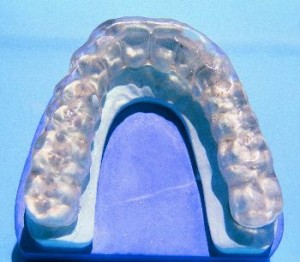
- Mouth Guards for teeth grinding
The most common and immediate treatment by most dentist would be to make a splints or mouth guards for teeth grinding. A mouth guard or splint is usually made from a plastic material. This plastic material is usually a few millimeters thick and will fit snugly onto the teeth. Most of the time it is transparent, but it can be colored as well. This mouth guard will form a barrier between your upper and lower teeth so that it will prevent grind away of teeth. Mouth guards also help keep the jaw in a constant relaxed position, reducing grinding habits.
Treatment to help relief the pain or jaw muscle:
- Hot and cold packs to the jaw muscle.
- Avoid eating food which are hard to chew.
- Do some stretching exercise for the jaw.
- Take an aspirin or paracetamol.
Teeth Grinding Causes
- High stress and tension.
- Eating hard to chew food like nuts.
- Excessive chewing of food, for example chewing gum.
- Malocclusion of teeth ( Mal arrangement of teeth in the mouth, causing uneven biting and teeth grinding)
Test and Diagnosis of Teeth Grinding
- At chair side the dentist can usually detect teeth being worn away by teeth grinding habits.
- Temporomandibular Joint Disorders can also be palpated and tested for clicking sounds by the dentist.
- The dentist would also have to quiz the patient on their daily activities and gauge their stress levels.
- Husbands or wives present can also be quizzed on whether their partners make grinding sounds at night.
- Their is no scientific diagnosis in the lab for teeth grinding. The diagnosis is subjectively made by the dentist at chair side.
Prognosis of Teeth grinding
Prognosis is usually good. However, success of the treatment varies. Some might just stop the teeth grinding habits by themselves, some may take a few month or few years and some may never break the habit.
Complications of Teeth Grinding
- Severe Temporomandibular Joint Disorders.
- Constant aches and pain felt at the jaw area.
- Wearing away of teeth structure, causing severe teeth sensitivity, ugly looking teeth and derailment of normal bite.
When to contact a doctor
- Pain and fatigue felt on opening the jaw and eating.
- Loud clicking noise heard on opening of the mouth.
- Teeth look worn off and shorter.
- Jaw feels sore upon waking up in the morning.
- Insomnia and complaints from sleeping partner.
Pictures of Teeth Grinding

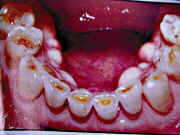
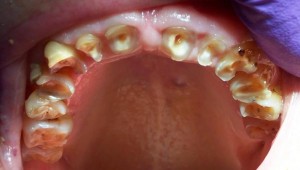
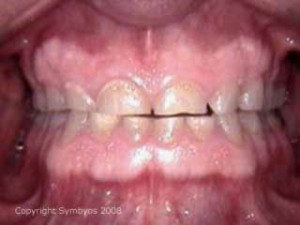
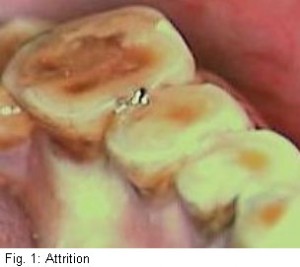
Types of mouth guards for teeth grinding.
1. stock mouthpieces,
2. “boil and bite” mouthguards,
3. and custom guards.
The most common and immediate teeth grinding treatment to see more how to + mouthguards and reviews.
Pingback: Most asked questions on Dental Implants part 2 | Intelligent Dental
Pingback: What are Dental Crowns ? | Intelligent Dental